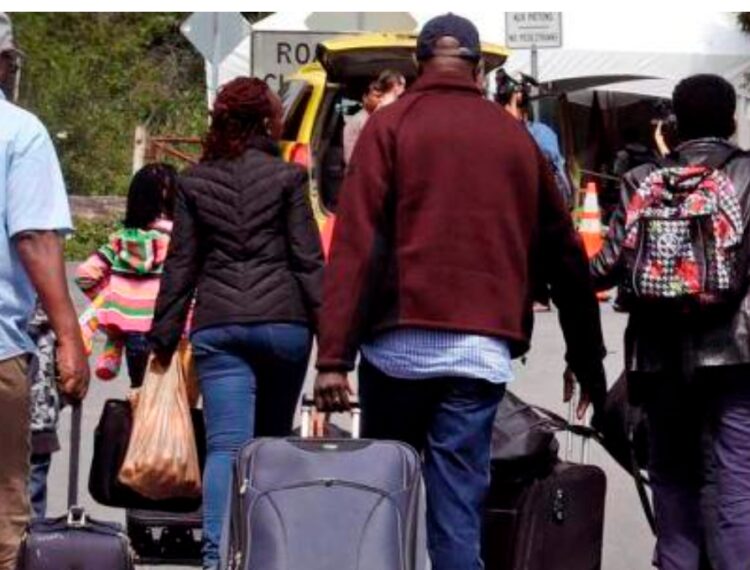News
Senate panel adjourns over minister’s ‘ignorance’ about Fed Govt’s housing schemes

The Senate Committee on Housing yesterday deferred its budget defence session with the Minister of State for Housing and Urban Development, Yusuf Abdullahi-Ata.
This followed the minister’s confession that he was unaware of the difference between the National Housing Scheme and the Renewed Hope Agenda Housing Scheme initiated by President Bola Ahmed Tinubu’s administration.
At the beginning of his presentation, the minister of state told the committee that he was delegated by the main minister, Ahmed Dangiwa, who was out of the country on a trip with President Tinubu.
In the course of the session, two members of the committee – Senators Abdul Ningi and Jimoh Ibrahim – disagreed about the sites of the Renewed Hope Housing Schemes across the states of the federation.
Abdullahi-Ata said the ministry was building 7,522 housing units under the National Housing Programme, out of which 3,388 had been completed.
Members of the committee, which is chaired by Aminu Tambuwal, wanted to know the implementation status of the Renewed Hope Agenda Housing Scheme and how it was different from the ongoing National Housing Programme of the Federal Government.
Abdullahi-Ata replied: “I am still yet to understand the difference between the two.”
The minister of state, a former Speaker of the Kano State House of Assembly, joined the Tinubu cabinet last October, following a reshuffle.
On the status of the Renewed Hope Housing Scheme and Cities Programme and National Housing Programme, he said “7,522 housing units spread across the 35 states of federation and the Federal Capital Territory (FCT) are under construction, out of which 3,388 have been completed, while 4,134 units are still ongoing”.
The senators queried the visibility of the projects the minister listed in his presentation.
But he confessed that neither himself nor the permanent secretary in the ministry could give details about the projects because they were both new in the ministry.
Abdullahi-Ata appealed for a postponement of the budget defence to enable him have more time to prepare for it.
Tambuwal told the minister to “go and come back on Tuesday” next week.
Also, the Managing Director and Chief Executive of the Federal Mortgage Bank, Shehu Usman Ossidi, told the committee that out of the proposed N5 billion capital base for the bank, only N2.56 billion had been fully paid up.
Of the paid-up capital, he said the Federal Government contributed N2.5 billion while the Central Bank of Nigeria (CBN) contributed only N60 million out of its N1.5 billion share capital.
The bank chief said the Nigeria Social Insurance Trust Fund (NSITF) had also not contributed contribute its N1 billion share capital to the bank.
He urged the committee to intervene to ensure that the seed capital was not only met but that the bank recapitalised to meet the dynamics in the sector.
Also yesterday, Interior Minister Olubunmi Tunji-Ojo yesterday said the ministry successfully executed multi-billion naira capital projects in 2024, despite not receiving any capital allocation.
The ministry achieved the feat by reviewing and enforcing existing contracts and by compelling contractors to fulfill their obligations, as stipulated in their agreements.
Speaking during the 2025 budget defence session before the National Assembly’s Joint Committee on Interior, Tunji-Ojo said some of the contracts dated as far back as 1999 and that they had been abandoned by contractors, either in breach of the contract terms or under Public Private Partnership (PPP) or concession agreements.
“We were able to complete automation e-gates, the command and control centre, resource centres, visa approval centres, solar farms, and other projects by thinking outside the box,” he said.
Tunji-Ojo stressed that the ministry achieved the milestones without incurring additional costs to the government.
“We didn’t spend a kobo of government money to do some of these things. What we did was avoid entering into new contracts. Instead, we reviewed existing ones and implemented value proposition management to ensure contractors fulfilled their obligations.
“For example, someone with a contract for issuing visa approval centres (VACs) hadn’t built a VAC centre. We had to ensure they delivered. Another contractor providing border control solutions implemented the software component but failed to deliver the hardware, which is essential for e-gate solutions. I made it clear that contracts cannot be implemented partially but that they must be executed holistically,” he said.
Following his presentation, the Chairman of the Senate Committee on Interior, Adams Oshiomhole, and his House of Representatives counterpart, Abdullahi Aliyu, praised Tunji-Ojo for surpassing the 2024 revenue target, despite the zero capital allocation.
But when a committee member alluded to an omission of tender fees in the budget proposal, the minister apologised and promised to provide the details promptly.
Also yesterday, the House of Representatives Committee on Public Accounts has said weaknesses in the nation’s auditing and accounting systems fuel corruption in the public finances.
Speaking at the budget defence of the Office of the Auditor General for the Federation (OAuGF), the Chairman of the Committee, Bamidele Salam (PDP, Osun), noted that as a result of the weaknesses, pervasive corruption was depriving government of revenue to function and deliver the needed development in the country.
The lawmaker was reacting to the budget presentation by the Auditor General for the Federation, Shaakaa Kanyitor Chira.
The AuGF informed the committee that there were various challenges hindering the operations of the office.
Chira said the office was grossly underfunded and understaffed to discharge its enormous responsibilities resulting in late compilation and submission of the annual reports.
Responding, Salam said: “There is a lot of money that ought to accrue to government that we are losing as a result of weaknesses in our accounting systems, weaknesses in auditing, weaknesses in general financial management architecture. This also has been reflected even in the budget performance of the Auditor General’s office.
“The committee raised a few observations also on the need for the Auditor General to expand its coverage of major Ministries, Departments and Agencies (MDAs) of government in a manner that will put greater attention on the places that have more of the revenue.
“There are some major agencies of government that have not been well audited in the last couple of years. If you don’t audit properly, you are giving an indication that there is less attention on certain agencies and that may promote a lot of impunity happening in those agencies.
“Even though the Auditor General has limitations because of budgetary constraints, because of personnel constraints, the office is mandated to audit almost 1,000 Ministries, Departments and Agencies of government, do periodic audits, appoint auditors for those that they are not going to audit directly.
“All this will require a lot of resources and manpower. We saw these gaps again in the presentation made today, and we are going to work as a parliament in cooperation with our sister committees that directly oversight some of these agencies in a manner that will make the work of the Auditor General to be more impactful, to be more result-oriented.”
The National Assembly Joint Committee on Finance yesterday set a revenue target of N25 trillion for the Federal Inland Revenue Service (FIRS) for the 2025 fiscal year.
The committee hailed the agency’s Executive Chairman, Dr. Zaccheus Adedeji, for raking in N21.6 trillion above its target of N19.4 trillion in 2024.
The resolution of the committee was announced during an interactive session with Adedeji and his management team in Abuja.
Following Adedeji’s presentation, the Deputy Chairman of the House of Representatives Committee on Finance, Saidu Musa Abdullahi, described the performance as unprecedented.
“The feat attained by FIRS on revenue collection or generation in 2024 was unprecedented and wonderful; it’s worthy of commendation.
“That you surpassed the target set for the agency in the 2024 Appropriation Act from N19.4 trillion to N21.6 trillion is very cheering and encouraging,” Abdullahi said.
He urged the FIRS chairman to understudy the South African template, saying it helped the country to generate revenue from tax collections far above that of Nigeria, despite having a smaller population of about 45 million to 54 million people, compared to Nigeria’s estimated over 200 million population.
“We shall give you total support on your tax reforms, but you need to bring in more number of taxable citizens into the net from the informal sector,” he said.
Also, Senator Joel Onowakpo Thomas (PDP, Delta South) hailed Adedeji and his team.
He said focusing more on tax is the way to go, adding that this was why FIRS must deepen the process through targeted reforms.
Also yesterday, the National Assembly Joint Committee on Basic Education Bodies queried the National Examinations Council (NECO) for spending the revenue it generated from selling Senior School Certificate Examination (SSCE) registration forms without permission in 2024.
The committee issued the query when the NECO Registrar, Prof. Ibrahim Wushishi, appeared before the panel to defend the 2024 budget performance and 2025 proposal.
The committee stepped down the examination body’s budget defence due to discrepancies in its presentation.
Wushishi told the committee that NECO realised over N22 billion from the sales of the registration forms at the rate of N22,250 to over 1.3 million candidates for the examination in 2024.
The registrar said of the revenue, the Federal Government deducted N9.5 billion and the balance was spent on the overhead cost of the agency.
But the committee said this did not add up, as the registrar noted that the government deducts 50 per cent, leading the lawmakers to query how it would amount to N9.5 billion.
Wushishi said: “Because of the fiscal policy of the government to deduct 50 per cent directly from source, the government has taken N9.5 billion from the same account, which makes NECO difficult to operate.
“We are still reconciling and following up with the Office of the Accountant General of the Federation to see how we can reconcile and put our house in order and submit.
Following the development, the committee adopted a motion to step down the budget defence due to insufficient documents and the inability of the NECO registrar to give satisfactory explanation on the 2024 budget performance.
President Bola Ahmed Tinubu has approved the recruitment of 5,000 personnel to tackle overcrowding and strengthen the Nigerian Correctional Service (NCoS).
The acting Comptroller General of the service, Sylvester Nwakuche Ndidi, announced this during a presentation to the House of Representatives Committee on Reformatory Institutions, chaired by Chinedu Ogar.
Ndidi said though the President granted the approval in August 2024, the recruitment process was delayed due to funding constraints.
He assured the lawmakers that the recruitment would start once the Civil Defence, Correctional, Fire, and Immigration Services Board (CDCFIB) approved the funding in the 2025 budget.
During the presentation, the committee members expressed frustration over the delay, stressing the need to address overcrowding in correctional facilities.
A member of the committee, Victor Ogene, called for transparency in the recruitment process, stressing the essence of timely action.
Ndidi presented the NCS’s proposed 2025 budget, amounting to N183.6 billion.
Key allocations included personnel costs of N127 billion, overhead costs of N45.8 billion and capital expenditure of N13.4 billion.
He said a significant portion — N38 billion — was earmarked for feeding the country’s 91,100 inmates at a daily cost of N1,125 per inmate.
The acting CG raised concerns about the reduction in capital expenditure by N762 million and called for an additional N70.4 billion to modernise custodial facilities, enhance security, and digitise inmate management.
The Group Chief Executive Officer (GCEO) of the Nigerian National Petroleum Company Limited (NNPCL), Dr. Mele Kyari, has said the company remitted N10 trillion to the Federation Account last September.
He also claimed that NNPCL “is the only company in Nigeria that publishes 100 per cent of its account on a yearly basis”.
Kyari spoke during his presentation on revenue generation and performance of the NNPCL in 2024 and its projection for 2025 before the National Assembly Joint Committee on Finance in Abuja.
The GCEO described the NNPCL as the highest tax payer in the country as well as highest payer of royalty and dividends.
He announced that the company wanted a forensic audit to be conducted on the money it spent to stabilise the price of petrol from January to September 2024 and for uninterrupted supply of petroleum products.
“Until October 1, 2024, NNPCL, as mandated by the Petroleum Industry Act (PIA), acted as the supply of last resort on fuel supply, which requires forensic audit to know how much NNPCL is being owed or owing any agency.
“Our transactional account is very transparent, which is published on yearly basis, making NNPCL the only company in Nigeria noted for that and also the highest tax payer in the country as well as highest payer of royalty and dividends to shareholders as a commercial national oil company,” he said.
Kyari told the joint committee that the company’s revenue projection for 2025 would be made after the meeting of its board of directors in two weeks.
The National Assembly Joint Committee on Finance yesterday exonerated the Joint Admission and Matriculation Board (JAMB) over alleged financial impropriety the lawmakers made against it during its presentation on Monday.
JAMB’s Registrar, Prof. Ishaq Oloyede, had said the examination body spent N1.1 billion on meals, N850 million for fumigation, among others.
But Senator Adams Oshiomhole (APC, Edo North) queried the board over its spending and asked the registrar to justify N850 million allegedly spent on security, cleaning, and fumigation in 2024.
But in a statement yesterday in Abuja, 48 hours after the session, the Chairman of the National Assembly Joint Committee on Finance, Senator Sani Musa (APC, Niger East), said the JAMB registrar was wrongly accused of reckless spending based on the latest documents submitted to the committee by the examination body.
The statement, titled: Clarification on the JAMB Report on Revenue, reads: “For the purpose of clarity, the comprehensive report provided by JAMB indicates that the line items mentioned during Monday’s hearing on revenue do not suggest any mismanagement or misuse of the board’s funds.
“On the contrary, the report highlights the responsible and prudent use of resources under the leadership of the Registrar.
“The Registrar of JAMB, Professor Is-haq Oloyede, deserves commendation for demonstrating financial discipline and accountability in managing the board’s resources effectively.
“This level of stewardship serves as a model for public institutions across the nation.”
News
Banditry:” I was chained for 32days while in their den, killed my wife as I watch-Nat’l Assembly DD narrates experience

A Deputy Director at the National Assembly Commission, Michael Adesiyan, has narrated his near-death experience in the hideout of bandits.
Adesiyan was abducted from his Chikakore residence in Kubwa, a suburb in the nation’s capital, alongside his wife on January 26th, 2025 before he was rescued on April 7.
The civil servant narrated his ordeal to journalists at National Counter-Terrorism Centre, Abuja, when fresh 60 kidnapped victims, who were rescued by the security forces were presented to the National Security Adviser, Nuhu Ribadu.
Adesiyan called on the federal government to immediately look for a way to disarm the criminals and educate them, and possibly reintegrate them back to the society, adding that “the bandits don’t know what they are doing.”
According to him, his abductors were between the ages of 17 and 20, and they were stark illiterate people who were not aware of what they were doing, and could not even count N1 million let alone hundreds of millions they were asking as ransom.
He specifically said they were chained for 32 days he spent in the abductors’ den, adding that they killed his wife in his presence.
“I want to thank the government for rescuing us. I was chained for 32 days. I want to advise that the government should find away to disarm or arrest them (bandits), instead of confronting them.
“They can send them to school. Some cannot even count one million. They are stark illiterates. They are young people of ages 17 and 21. They don’t know what they are doing.
“So if they can bring them out, if they want to learn work (apprenticeship), they can let them do, retrain them, reorientate them, that they can be useful to themselves.
“My advice is to, instead of killing them, arrest them, reorientate them. If you want to educate them, they can then work. That’s my advice,” he said.
When asked why they were in a rush to tell their family members to pay ransom, he said, “When they kill someone in your presence, you would give them anything they want.
“For instance, they killed my wife in my presence. If they request your head in that situation, you will give it to them.”
Earlier, while giving a breakdown, the Coordinator, National Counter-Terrorism Centre, Maj. Gen Adamu Laka said the victims comprising 35 males and 25 females, were rescued on Monday April 7, by troops of 1 Division of the Nigerian Army, in a coordinated operation supported by other security and intelligence agencies.
News
US revokes more than 500 foreign student visas

No fewer than 500 foreign students have had their US visas revoked in recent weeks, as Donald Trump’s administration doubles down on its crackdown on universities.
Nafsa, a network of universities and individuals engaged in international education and exchanges, told the Financial Times on Tuesday it had identified 500 visa revocations by compiling reports from higher education institutions across the US.
“This is uncharted territory on so many levels,” Fanta Aw, chief executive of Nafsa said. “It’s at an unprecedented level and it’s quite concerning because there is a lack of clarity which is creating anxiety.”
The Department of Homeland Security and the Department of State are implementing a wave of actions against university students across the country. Institutions are often unaware that their students have been targeted so cannot easily track their cases or offer support.
The state department’s visa revocations require students to leave the US and reapply for visas after fresh scrutiny. Separately, the homeland security department has triggered “status termination”, Aw said. In both cases, she added, the processes for appeal were unclear.
“There will be a tsunami of legal cases coming,” she warned.
Multiple reports have arisen of foreign students and university employees being taken to detention centres and subsequently facing deportation.
A number of universities have issued warnings to students and faculty against travelling abroad for fear of arbitrary questioning or detention on returning to the US.
Aw said reports of visa revocations had spiralled from students at elite universities — including Stanford, Harvard and Columbia — to a far wider range of higher education institutions across the country. They targeted many different nationalities for a variety of reasons, including for traffic violations.
Since Trump’s election, a growing number of US-based faculty have sought jobs elsewhere, and increasing numbers of high school and college students are applying to universities abroad.
The Central European University in Vienna on Tuesday said US applicants for its programmes in the upcoming academic year had jumped one-quarter, while the University of Toronto reported a “meaningful” rise compared to past years.
On Monday, 16 associations of US universities called for a briefing from the homeland security and state departments, after uncoordinated orders from the authorities requested students to “self-deport”.
The group said the orders contained “no additional information about how to appeal this decision or verification to ensure that mistakes are not being made in identifying these individuals”.
The association warned of the implications for the country given the 1mn international students attending US colleges and universities, who contributed an estimated $43.8bn to the economy, created 375,000 domestic jobs and contributed “to institutions’ intellectual vibrancy and the global literacy of domestic students”.
The homeland security department did not reply to a request to comment.
News
Japa: Nigeria loses $366m as 16,000 doctors move abroad

The Coordinating Minister of Health and Social Welfare, Prof Muhammad Pate said over 16,000 Nigerian doctors have left the country in the last five to seven years to seek greener pastures in other countries.
Prof Pate also said the doctor-to-population ratio is now 3.9 per 10,000 in the country, while the estimated cost of training one doctor exceeds $21,000.
This was as he lamented that nurses and midwives who left have also thinned the number of healthcare workers in the country.
The minister disclosed this at the seventh annual capacity building workshop of the Association of Medical Councils of Africa in Abuja on Tuesday with the theme, “Integrated healthcare regulation and leadership in building resilient health systems.”
According to him, an increasing number of Nigeria’s talented healthcare professionals aspire to work in other countries, driven by factors such as economic opportunity, better working conditions, more advanced training, and superior research environments abroad.
He said the migration of health professionals from developing countries is not new, but it has accelerated in recent years.
“In Nigeria alone, over 16,000 doctors are estimated to have left the country in the last five to seven years, with thousands more leaving in just the past few years. Nurses and midwives have also thinned in numbers. The doctor-to-population ratio now stands at around 3.9 per 10,000—well below the suggested global minimum.
“But this trend is not just about people leaving. It represents a fiscal loss.
The estimated cost of training one doctor exceeds $21,000—a figure that reflects the magnitude of public financing walking out of our countries. It deeply affects our health systems—leaving many of our rural communities critically underserved.”
He, however, emphasised that the phenomenon offers an opportunity to rethink and reshape the policies, to manage the valuable health workforce in ways that benefit our countries first and foremost.
“In Nigeria, guided by the vision of President Bola Ahmed Tinubu, who was appointed by African Heads of State as the AU’s Continental Champion for Human Resources for Health and Community Health Delivery—we are pursuing a new direction. His vision is that Nigeria becomes a prosperous, people-oriented country, contributing to a peaceful and thriving continent. Not a standalone Nigeria, but a Nigeria that is interlinked with all our neighbours and sister countries. Under the Renewed Hope Agenda, and within the framework of the Nigeria Health Sector Renewal Investment Initiative, we have embraced a new path—combining strategic realism with visionary ambition.
“The National Policy on Health Workforce Migration is a cornerstone of this path. It is designed to address health workforce migration with dignity—dignity for health workers, for the country, and for the profession. It is data-driven, evidence-guided, and signals a clear direction. This is not a restrictive policy, nor is it one born out of resignation. We understand that the global health workforce shortage is at 18 million, and countries in the Global North face their own human resource crises due to demography and other factors. But our response is based on stewardship—balancing the rights of health professionals to seek opportunities abroad with our duty to protect the integrity and viability of our national health system.
“The objectives are clear. To retain and motivate health workers currently serving in Nigeria—thousands of whom work under difficult conditions; to establish ethical norms and explore bilateral frameworks for recruitment, aiming to correct global asymmetries; to expand training capacity—not only for domestic needs, but to contribute to global workforce needs, to enable structured reintegration for the thousands of Nigerian professionals abroad; and to strengthen governance, improve regulatory coordination, and build real-time data systems.”
He urged Africa to lead in forging a new global compact on health workforce mobility—anchored in pan-African training and accreditation standards; shared planning tools, evidence, and data; continental negotiating platforms with destination countries; and sustained investments in the people who care for our people.
The President of AMCOA, Prof Joel Okullo, stressed the importance of collaboration among African countries to tackle healthcare challenges and improve regulation and leadership across the continent.
He expressed the belief that the outcome of the workshop would produce actionable strategies to improve healthcare services across Africa.
“This year’s theme highlights our commitment to tackling the diverse array of challenges within the health regulatory landscape. It seeks to empower AMCOA members and associate members with the wisdom and skills needed for informed strategic and operational decisions in the coming year.
“In this intricate regulatory tapestry, our discussions will illuminate strategies and insights that will bolster regulators’ capabilities. Our focus will revolve around managing health workforce mobility, improving credentialing and information data management systems
“Let us embark on this journey with enthusiasm and a shared sense of purpose. Our collaborative efforts today and over the next few days will lay the groundwork for transformative changes that will resonate across the healthcare landscape of Africa,” he noted.
The Registrar of the Medical and Dental Council of Nigeria, Dr Fatima Kyari, while welcoming participants to the event, noted that it was Nigeria’s first AMCOA workshop while commending the alignment of leadership towards the shared goal of patient safety.
The Board Chairperson of MDCN, Prof Afolabi Lesi highlighted the need for healthcare regulators to uphold global standards while adapting to local contexts.
Lesi, who is also the Chairman of the Local Organizing Committee for the workshop addressed the challenges of fragmented professional relationships that hinder implementation and compromise patient care.
“The reality is that while we have committed and clear directions at the level of governance, implementation of actions is bedeviled by the fractioned and fractious relationship among health workers who ought to be working as a team, with the patient (well-being and safety) as the primary focus of all our actions,” he said.
Photo caption: Members of AMCOA; the Registrar of MDCN, Dr Fatima Kyari; the Board Chairperson of MDCN, Prof Afolabi Lesi; the Coordinating Minister of Health and Social Welfare, Prof Muhammad Pate; the Minister of State of Humanitarian Affairs and Poverty Reduction, Dr Yusuf Sununu; and other AMCOA members.
-

 News16 hours ago
News16 hours agoOERAF held memorial lecture on conflict resolution, security/safety of community in Nigeria
-

 News22 hours ago
News22 hours agoTRADE WAR! U.S. angry over Nigeria’s import ban on 25 products
-

 News2 hours ago
News2 hours agoUS revokes more than 500 foreign student visas
-

 News22 hours ago
News22 hours agoINTERVIEW: Introduction of Child Rights Curriculum In Nigerian Universities Will Take CRA to Families – Dr Obiorah Edogor
-

 News16 hours ago
News16 hours agoHoR Minority Caucus decries killings in Plateau, Benue states, urges immediate presidential decisive actions
-

 News8 hours ago
News8 hours agoBandits have seized control of 64 communities in Plateau – Gov Muftwang
-

 News4 hours ago
News4 hours agoIbas picks administrators for 23 Rivers LGs(SEE list)
-

 Economy8 hours ago
Economy8 hours agoMobile Money transactions hit $1.68trn in one year

















